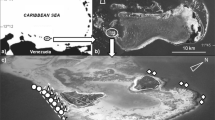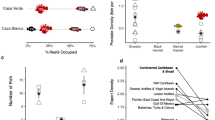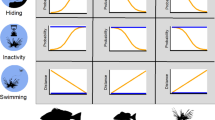Abstract
The harmful effects of lionfish (Pterois volitans) invasion on ecosystems already affected by overfishing, pollution and climate change in the western Atlantic are widely known. However, despite the detrimental consequences, it is also a unique opportunity to explore differences between invasive and resident species that may have led to the success of the invader. Using a functional morphology approach, we evaluated whether lionfish has novel traits and how they influenced the theoretical ecological space of some of the main small Caribbean reef predators. Additionally, we assessed if the native community generated biological resistance on the density of the invader. Lionfish and 12 native Caribbean small reef predators were used in this study. Thirteen characters were used to produce a morpho-functional space that defined the guild. A correlation was made between the total density of predators and that of lionfish. Morphological analyses indicated that the invasive species presents novel morphological traits, in comparison to native species. Additionally, the invader influences the reduction of the theoretical ecological space, suggesting competition with five Caribbean coral reef meso-predators. On the other hand, our data does not support the biological resistance hypothesis of native predators being the phenomenon that controls lionfish density.





Similar content being viewed by others
References
Acero PA, Bustos-Montes D, Pabón P, Polo-Silva CJ, Sanjuan A (2018) Feeding habits of Pterois volitans: a real threat to Caribbean coral reef biodiversity. In: Makowski C (ed) Impacts of invasive species on coastal environments: coasts in crisis. Springer, Berlin, pp 269–314. https://doi.org/10.1007/978-3-319-91382-7_8
Ahrenholz DW, Morris JA (2010) Larval duration of the lionfish, Pterois volitans, collected from the Bahamian Archipelago. Environ Biol Fishes 88:305–309. https://doi.org/10.1007/s10641-010-9647-4
Albins MA, Hixon MA (2008) Invasive Indo-Pacific lionfish Pterois volitans reduce recruitment of Atlantic coral-reef fishes. Mar Ecol Prog Ser 367:233–238. https://doi.org/10.3354/meps07620
Albins MA, Hixon MA (2013) Worst case scenario: potential long-term effects of invasive predatory lionfish (Pterois volitans) on Atlantic and Caribbean coral-reef communities. Environ Biol Fish 96:1151–1157. https://doi.org/10.1007/s10641-011-9795-1
Albins MA, Lyons PJ (2012) Invasive red lionfish Pterois volitans blow directed jets of water at prey fish. Mar Ecol 448:1–5. https://doi.org/10.3354/meps09580
Allen GR, Eschmeyer WN (1973) Turkeyfishes at Eniwetok. Pac Discov 26:3–11
Arias EJ, González C, Cabrera JL, Christensen V (2011) Predicted impact of the invasive lionfish Pterois volitans on the food web of a Caribbean coral reef. Environ Res 111:917–925. https://doi.org/10.1016/j.envres.2011.07.008
Azzurro E, Tuset VM, Lombarte A, Maynou F, Simberloff D, Rodríguez-Pérez A, Solé RV (2014) External morphology explains the success of biological invasions. Ecol Lett 17:1455–1463. https://doi.org/10.1111/ele.12351
Betancur-R R, Hines A, Acero PA, Ortiz G, Wilbur AE, Freshwater DW (2011) Reconstructing the lion fish invasion: insights into Greater Caribbean biogeography. J Biogeogr 38:1281–1293. https://doi.org/10.1111/j.1365-2699.2011.02496.x
Blake RW (2004) Fish functional design and swimming performance. Fish Biol 65:119. https://doi.org/10.1111/j.0022-1112.2004.00568.x
Breder CM (1963) Defensive behavior and venom in Scorpaena and Dactylopterus. Copeia 4:698–700. https://doi.org/10.2307/1440974
Camp AL, Brainerd EL (2014) Role of axial muscles in powering mouth expansion during suction feeding in largemouth bass (Micropterus salmoides). J Exp Biol 217:1333–1345. https://doi.org/10.1242/jeb.095810
Carroll AM, Wainwright PC (2009) Energetic limitations on suction feeding performance in centrarchid fishes. J Exp Biol 212:3241–3251. https://doi.org/10.1242/jeb.033092
Carroll AM, Wainwright PC, Huskey SH, Collar DC, Turingan RG (2004) Morphology predicts suction feeding performance in centrarchid fishes. J Exp Biol 207:3873–3881. https://doi.org/10.1242/jeb.01227
Collar DC, Wainwright PC (2006) Discordance between morphological and mechanical diversity in the feeding mechanism of centrarchid fishes. Evolution 60:2575–2584. https://doi.org/10.1554/06-276.1
Cornwell WK, Schwilk DW, Ackerly DD (2006) A trait-based test for habitat filtering: convex hull volume. Ecology 87:1465–1471. https://doi.org/10.1890/0012-9658(2006)87%5b1465:ATTFHF%5d2.0.CO;2
Coronado-Carrascal V, García-Urueña R, Acero PA (2015) Comunidad de peces arrecifales en relación con la invasion del pez león: el caso del Caribe sur. Bol Invest Mar Cost 44:291–302. http://www.scielo.org.co/scielo.php?script=sci_arttext&pid=S0122-97612015000200004&lng=en&nrm=iso
Costello R, Frankel N, Gamble M (2012) Allometric scaling of morphological feeding adaptations and extreme sexual dimorphism in energy allocation in invasive lionfish. Dartmouth Undergrad J Sci 12:39–41
Côté IM, Maljkovic A (2010) Predation rates of Indo-Pacific lionfish on Bahamian coral reefs. Mar Ecol Prog Ser 404:219–225. https://doi.org/10.3354/meps08458
Côté IM, Green SJ, Hixon MA (2013) Predatory fish invaders: insights from Indo-Pacific lionfish in the western Atlantic and Caribbean. Biol Conserv 164:50–61. https://doi.org/10.1016/j.biocon.2013.04.014
Dahl KA, Patterson WF III (2014) Habitat-specific density and diet of rapidly expanding invasive red lionfish, Pterois volitans, populations in the northern Gulf of Mexico. PLoS ONE 9:e105852. https://doi.org/10.1371/journal.pone.0105852
Darwin C (1859) The origin of species. John Murray, London
Day SW, Higham TE, Holzman R, Van Wassenbergh S (2015) Morphology, kinematics, and dynamics: the mechanics of suction feeding in fishes. Integr Comp Biol 55:21–35. https://doi.org/10.1093/icb/icv032
Dittel AI, Epifanio CE (2009) Invasion biology of the Chinese mitten crab Eriocheir sinensis: a brief review. J Exp Mar Biol Ecol 374:79–92. https://doi.org/10.1016/j.jembe.2009.04.012
Du F, Zhang XC, Sui Y, Shao M, Hu L, Shan L (2012) The relationship between aboveground biomass and Voronoi area of coexisting species in an old-field community. Pol J Ecol 60:479–489. http://yadda.icm.edu.pl/baztech/element/bwmeta1.element.baztech-article-BGPK-3656-4179
Elton CS (1958) The ecology of invasions by animals and plants. University of Chicago Press, London
Facon B, Genton BJ, Shykoff J, Jarne P, Estoup A, David P (2006) A general eco-evolutionary framework for understanding bioinvasions. Trends Ecol Evol 21:130–135. https://doi.org/10.1016/j.tree.2005.10.012
Ferreira CEL, Luiz OJ, Floeter SR, Lucena MB, Barbosa MC, Rocha CR, Rocha LA (2015) First record of invasive lionfish (Pterois volitans) for the Brazilian coast. PLoS ONE 10:e0123002. https://doi.org/10.1371/journal.pone.0123002
Fishelson L (1975) Ethology and reproduction of pteroid fishes found in the Gulf of Aqaba (Red Sea), especially Dendrochirus brachypterus (Cuvier), (Pteroidae, Teleostei). Pubbl Staz Zool Napoli 39:635–656
Fishelson L (1997) Experiments and observations on food consumption, growth and starvation in Dendrochirus brachypterus and Pterois volitans (Pteroinae, Scorpaenidae). Environ Biol Fishes 50:391–403. https://doi.org/10.1023/A:1007331304122
Fisher R, Hogan JD (2007) Morphological predictors of swimming speed: a case study of pre-settlement juvenile coral reef fishes. J Exp Biol 210:2436–2443. https://doi.org/10.1242/jeb.004275
Fisher R, Leis JM, Clark DJ, Wilson SK (2005) Critical swimming speeds of late-stage coral reef fish larvae: variation within species, among species and between locations. Mar Biol 147:1201–1212. https://doi.org/10.1007/s00227-005-0001-x
García-Urueña R, Acero PA, Coronado-Carrascal V (2015) Reef fish community in presence of the lionfish (Pterois volitans) in Santa Marta, Colombian Caribbean. Rev MVZ Córdoba 20:4989–5003. https://doi.org/10.21897/rmvz.13
Gonzalez-Corredor JD, Acero PA, García-Urueña R (2016) Densidad y estructura de tallas del pez león Pterois volitans (Scorpaenidae) en el Caribe occidental insular colombiano. Bol Invest Mar Cost 45:317–333. http://www.scielo.org.co/scielo.php?pid=S0122-97612016000200317&script=sci_abstract&tlng=es
Gosline WA (1994) Function and structure in the paired fins of Scorpaeniformes fishes. Environ Biol Fishes 40:219–226. https://doi.org/10.1007/BF00002508
Hackerott S, Valdivia A, Green SJ, Côté IM, Cox CE, Akins L, Layman CA, Precht WD, Bruno JF (2013) Native predators do not influence invasion success of Pacific lionfish on Caribbean reefs. PLoS ONE 8:e68259. https://doi.org/10.1371/journal.pone.0068259
Hardin G (1960) The competitive exclusion principle. Science 131:1292–1297. http://www.jstor.org/stable/1705965
Hernández I, Aguilar C, González Sansón G (2008) Tramas tróficas de peces de arrecifes en la región noroccidental de Cuba: Contenido estomacal. Rev Biol Trop 56:541–555. http://www.scielo.sa.cr/scielo.php?script=sci_arttext&pid=S0034-77442008000200012&lng=en
Higham TE (2011) Feeding mechanics. In: Farrell AP (ed) Encyclopedia of fish physiology: from genome to environment. Academic Press, San Diego, pp 597–602
Kane EA, Higham TE (2011) The integration of locomotion and prey capture in divergent cottid fishes: functional disparity despite morphological similarity. J Exp Biol 214:1092–1109. https://doi.org/10.1242/jeb.052068
Keane RM, Crawley MJ (2002) Exotic plant invasions and the enemy release hypothesis. Trends Ecol Evol 17:164–170. https://doi.org/10.1016/S0169-5347(02)02499-0
Kendall JJ (1990) Further evidence of cooperative foraging by the turkeyfish Pterois miles in the Gulf of Aqaba, Red Sea, with comments on safety and first aid. Proc Am Acad Underw Sci Scient Diving Symp 10:209–223
Lauder GV (1980) The suction feeding mechanism in sunfishes (Lepomis): an experimental analysis. J Exp Biol 88:49–72. http://jeb.biologists.org/content/88/1/49.short
Levine JM, D’Antonio CM (1999) Elton revisited: a review of evidence linking diversity and invisibility. Oikos 87:15–26. https://www.jstor.org/stable/pdf/3546992.pdf
Levine JM, Adler PB, Yelenik SG (2004) A meta-analysis of biotic resistance to exotic plant invasions. Ecol Lett 7: 975–989. https://www.jstor.org/stable/pdf/3546992.pdf?seq=1#page_scan_tab_contents
Lodge DM (1993) Biological invasions: lessons for ecology. Trends Ecol Evol 8:133–137.https://doi.org/10.1016/0169-5347(93)90025-K
Lönnstedt OM, Ferrari MC, Chivers DP (2014) Lionfish predators use flared fin displays to initiate cooperative hunting. Biol Lett 10:20140281. https://doi.org/10.1098/rsbl.2014.0281
Macarthur R, Levins R (1967) The limiting similarity, convergence, and divergence of coexisting species. Am Nat 101:377–385. https://doi.org/10.1086/282505
MADS (2013). Plan para el manejo y control del pez león Pterois volitans en el Caribe colombiano. Ministerio del Ambiente y Desarrollo Sostenible, Bogota. http://www.invemar.org.co/redcostera1/invemar/portalinvasoresmarinos/docs/10059Plan_manejo_control_pez_leon.pdf
Maljković A, Leeuwen TEV, Cove SN (2008) Predation on the invasive red lionfish, Pterois volitans (Pisces: Scorpaenidae), by native groupers in the Bahamas. Coral Reefs 27:501. https://doi.org/10.1007/s00338-008-0372-9
McCleery C (2011) A comparative study of the feeding ecology of invasive lionfish (Pterois volitans) in the Caribbean, vol 9. Physis: CIEE Research Station Bonaire, pp 38–43
Morris JA Jr (2009) The biology and ecology of the invasive Indo-Pacific lionfish. North Carolina State University, Raleigh
Morris JA Jr, Akins JL (2009) Feeding ecology of the invasive lionfish in the Bahamian archipelago. Environ Biol Fishes 86:389–398. https://doi.org/10.1007/s10641-009-9538-8
Morris Jr JA, Whitfield PE (2009) Biology, ecology, control and management of the invasive Indo-Pacific lionfish: an updated integrated assessment, vol 99. NOAA Technical Memorandum NOS NCCOS 200, p 99
Muller M (1987) Optimization principles applied to the mechanism of neurocranium elevation and mouth bottom depression in bony fishes (Halecostomi). J Theor Biol 126:343–368. https://doi.org/10.1016/S0022-5193(87)80241-2
Mumby PJ, Harborne AR, Brumbaugh DR (2011) Grouper as a natural biocontrol of invasive lionfish. PLoS ONE 6:e21510. https://doi.org/10.1371/journal.-pone.0021510
Muñoz-Escobar L, Gil-Agudelo DL (2012) Dietary composition of the lionfish, Pterois volitans (Pisces: Scorpaenidae), in Santa Marta and Tayrona National Park. Bol Invest Mar Cost 41:471–477. https://doi.org/10.25268/bimc.invemar.2012.41.2.84
Norton SF (1991) Capture success and diet of cottid fishes: the role of predator morphology and attack kinematics. Ecology 72:1807–19. https://www.jstor.org/stable/1940980?seq=1#page_scan_tab_contents
O’Neill J, Charles R (1997) Economic impact of zebra mussels—results of the 1995 National Zebra Mussel Information Clearinghouse Study. Great Lakes Res Rev 3:1
Pabón PE, Acero A (2015) Ecología trófica del invasor pez león Pterois volitans en el Caribe colombiano: impacto sobre familias ícticas de Santa Marta y San Andrés. In: Campos NH, Acero A (eds) Contribuciones en Ciencias del Mar de la Universidad Nacional de Colombia-2015. CECIMAR Sede Caribe. Universidad Nacional de Colombia, Santa Marta, pp 49–66
Pimentel D, McNair S, Janecka J, Wightman J, Simmonds C, O’Connell C, Tsomondo T (2001) Economic and environmental threats of alien plant, animal, and microbe invasions. Agr Ecosyst Environ 84:1–20. https://doi.org/10.1016/S0167-8809(00)00178-X
R DCT (2013) R: a language and environment for statistical computing. R Foundation for Statistical Computing, Vienna. https://www.r-project.org/. Accessed 6 Jan 2017
Rabosky DL, Santini F, Eastman J, Smith SA, Sidlauskas B, Chang J, Alfaro ME (2013) Rates of speciation and morphological evolution are correlated across the largest vertebrate radiation. Nat Commun 4:1958. https://doi.org/10.1038/ncomms2958
Revell LJ (2012) Phytools: an R package for phylogenetic comparative biology (and other things). Methods Ecol Evol 3:217–223. https://doi.org/10.1111/j.2041-210X.2011.00169.x
Robertson DR, Peña EA, Posada JM, Claro R (2015) Peces costeros del Gran Caribe: Sistema de información en línea. Instituto Smithsonian de Investigaciones Tropicales. http://biogeodb.stri.si.edu/caribbean/es/pages. Accessed 24 Sept 2017
Ruiz GM, Rawlings TK, Dobbs FC, Drake LA, Mullady T, Huq A, Colwell RR (2000) Global spread of microorganisms by ships. Nature 408:49–50. https://doi.org/10.1038/35040695
Sambilay VC (1990) Interrelationships between swimming speed, caudal fin aspect ratio and body length of fishes. Fishbyte 8:16–20
Sax DF, Stachowicz JJ, Brown JH, Bruno JF, Dawson MN, Gaines SD, Rice WR (2007) Ecological and evolutionary insights from species invasions. Trends Ecol Evol 22:465–471. https://doi.org/10.1016/j.tree.2007.06.009
Schofield PJ (2009) Geographic extent and chronology of the invasion of nonnative lionfish (Pterois volitans [Linnaeus 1758] and P. miles [Bennett 1828]) in the western North Atlantic and Caribbean Sea. Aquat Invasion 4:473–479. https://doi.org/10.3391/ai.2009.4.3.5
Schofield PJ (2010) Update on geographic spread of invasive lion fishes (Pterois volitans [Linnaeus, 1758] and P. miles [Bennett, 1828]) in the Western North Atlantic Ocean, Caribbean Sea and Gulf of Mexico. Aquat Invasion 5:117–122. https://doi.org/10.3391/ai.2010.5.S1.024
Shea K, Chesson P (2002) Community ecology theory as a framework for biological invasions. Trends Ecol Evol 17:170–176. https://doi.org/10.1016/S0169-5347(02)02495-3
Smith SM, Fox RJ, Donelson JM, Head ML, Booth DJ (2016) Predicting range-shift success potential for tropical marine fishes using external morphology. Biol Lett 12:20160505. https://doi.org/10.1098/rsbl.2016.0505
Thys T (1997) Spatial variation in epaxial muscle activity during prey strike in largemouth bass (Micropterus salmoides). J Exp Biol 200:3021–3031. http://jeb.biologists.org/content/jexbio/200/23/3021.full.pdf
Van Leeuwen JL, Muller M (1983) The recording and interpretation of pressures in prey-sucking fish. Neth J Zool 33:425–475. https://doi.org/10.1163/002829683X00192
Villéger S, Mason NW, Mouillot D (2008) New multidimensional functional diversity indices for a multifaceted framework in functional ecology. Ecology 89:2290–2301. https://doi.org/10.1890/07-1206.1
Wainwright PC, Richard BA (1995) Predicting patterns of prey use from morphology of fishes. Environ Biol Fishes 44:97–113
Wainwright PC, Bellwood DR, Westneat MW, Grubich JR, Hoey AS (2004) A functional morphospace for the skull of labrid fishes: patterns of diversity in a complex biomechanical system. Biol J Linn Soc 82:1–25. https://doi.org/10.1111/j.1095-8312.2004.00313.x
Wainwright PC, Carroll AM, Collar DC, Day SW, Higham TE, Holzman RA (2007) Suction feeding mechanics, performance, and diversity in fishes. Integr Comp Biol 47:96–106. https://doi.org/10.1093/icb/icm032
Walker JA, Alfaro ME, Noble MM, Fulton CJ (2013) Body fineness ratio as a predictor of maximum prolonged-swimming speed in coral reef fishes. PLoS ONE 8:75422. https://doi.org/10.1371/journal.pone.0075422
Webb PW (1984) Body form, locomotion and foraging in aquatic vertebrates. Am Zool 24:107–120. https://doi.org/10.1093/icb/24.1.107
Webb PW (1994) The biology of fish swimming. In: Maddock L, Bone Q, Rayner JMV (eds) Mechanics and physiology of animal swimming. Cambridge University Press, Cambridge, pp 45–62
Westneat MW (2003) A biomechanical model for analysis of muscle force, power output and lower jaw motion in fishes. J Theor Biol 223:269–281. https://doi.org/10.1016/S0022-5193(03)00058-4
Westneat MW (2004) Evolution of levers and linkages in the feeding mechanisms of fishes. Integr Comp Biol 44:378–389. https://doi.org/10.1093/icb/44.5.378
Acknowledgements
We are thankful to many fishermen and diving companies that provided us with either lionfish or other predators for this study.
Funding
This study was funded by “Fundación para Promoción de la Investigación y la Tecnología”, research Projects 71019 and 3637, Banco de la República de Colombia.
Author information
Authors and Affiliations
Corresponding author
Ethics declarations
Conflict of interest
The authors declare that they have no conflict of interest.
Additional information
Publisher's Note
Springer Nature remains neutral with regard to jurisdictional claims in published maps and institutional affiliations.
Rights and permissions
About this article
Cite this article
Rojas-Vélez, S., Tavera, J. & Acero, A. Unraveling lionfish invasion: Is Pterois volitans truly a morphologically novel predator in the Caribbean?. Biol Invasions 21, 1921–1931 (2019). https://doi.org/10.1007/s10530-019-01946-6
Received:
Accepted:
Published:
Issue Date:
DOI: https://doi.org/10.1007/s10530-019-01946-6




